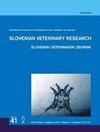EGG WEIGHT AFFECTS HATCHING RESULTS, BODY WEIGHT AND FEAR-RELATED BEHAVIOR IN JAPANESE QUAILS
IF 0.6
4区 农林科学
Q4 VETERINARY SCIENCES
引用次数: 0
Abstract
This study was conducted to determine effect of egg weight on hatching results, chick performance and tonic immobility duration in Japanese Quails. Eggs were weighed individually and divided by weight into four groups: group 1 = 11.0 11.9 g, group 2 = 12.0 12.9 g, group 3 = 13.0 13.9 g and group 4 = 14.0 14.9 g. Egg weight loss during incubation and hatching parameters were recorded. Additionally, hatching weight and body weight were measured until 5 weeks and tonic immobility (TI) test was performed at the end of the experiment. Results revealed that egg weight loss during incubation decreased as egg weight increased. Group 2 was determined as the best suitable egg weight group in terms of fertility and group 2 and 3 in terms of hatchability of incubated eggs and hatchability of fertile eggs. Body weight increased as the egg weight increased and the heaviest chicks were hatched from heaviest egg group. Significant differences in TI duration between birds were noticed, as higher body weight birds had longer TI duration than birds with lower body weight. Thus, birds of high body weight were more fearful than birds of low body weight. It was concluded that the medium to heavy weight eggs are better eggs for hatching results and chick weight. Therefore, we recommend the selection of medium and heavy weight eggs for hatching implementations in蛋的重量影响日本鹌鹑的孵化结果、体重和与恐惧有关的行为
本试验旨在研究蛋重对日本鹌鹑孵化结果、雏鸟生产性能和补益静止时间的影响。每只鸡蛋称重,按重量分为4组:1组= 11.0 11.9 g, 2组= 12.0 12.9 g, 3组= 13.0 13.9 g, 4组= 14.0 14.9 g。记录孵育期间蛋重损失及孵化参数。测定孵化重和体重至5周,试验结束后进行强直不动(TI)试验。结果表明,随着卵重的增加,孵化期间的卵重损失减小。以受精率为评价标准,确定2组为最适宜蛋重组,以孵化蛋孵化率和受精卵孵化率为评价标准,确定2组和3组为最适宜蛋重组。体重随蛋重的增加而增加,最重蛋组孵出最重的雏鸡。不同鸟类的TI持续时间存在显著差异,体重较高的鸟类比体重较低的鸟类TI持续时间更长。因此,高体重的鸟类比低体重的鸟类更可怕。综上所述,中重蛋为较好的孵化效果和鸡重蛋。因此,我们建议选择中、重蛋进行孵化实施
本文章由计算机程序翻译,如有差异,请以英文原文为准。
求助全文
约1分钟内获得全文
求助全文
来源期刊

Slovenian Veterinary Research
VETERINARY SCIENCES-
CiteScore
0.60
自引率
0.00%
发文量
12
审稿时长
>12 weeks
期刊介绍:
SLOVENIAN VETERINARY RESEARCH (ISSN 1580-4003) publishes original articles, which report the results of original research in most areas of biomedicine. The journal also publishes review articles dealing with rapidly developing areas of biomedicine or which update understanding of classical fields of biomedicine, as well as case reports, shorter scientific contributions, letters to the editor, etc.; which have not been published or are under consideration for publication elsewhere. Only papers written in English can be considered.
 求助内容:
求助内容: 应助结果提醒方式:
应助结果提醒方式:


